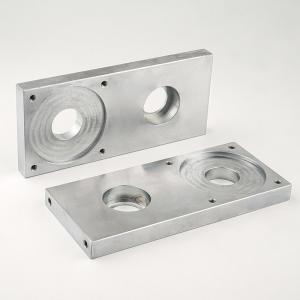

Add to Cart

CNC Machining Stainless Steel Machined Parts Custom CNC Machining Services
Milling CNC Part Aluminum Milled Parts
CNC machining stands as the prevailing subtractive manufacturing method today,
offering remarkable versatility and reliability in crafting bespoke metal and plastic components.
Leveraging CAD models, CNC machines meticulously eliminate material from solid blocks using
a diverse range of cutting tools.
In essence, CNC machining yields parts with precise tolerances and exceptional material
characteristics. It finds applicability in individual projects and low-to-medium volume
production (up to 10000 parts), owing to its superior repeatability.
Nonetheless, it imposes more design constraints compared to 3D printing, largely due to its
subtractive nature.
Product Details
We work with a diverse range of materials, including carbon alloys, aluminum, brass,
stainless steel, high nickel alloys, and engineered plastics.
If you are uncertain about the best material for your specific application, our expertise can guide
you in selecting the most suitable option, even if it happens to be a material not mentioned here.
| The Most Popular Materials | |
| Name | Characteristics |
| Aluminum 6061 | Good strength-to-weight ratio, excellent machinability, low hardness |
| Stainless Steel 304 | Excellent mechanical properties, resistant to corrosion & acid, relatively difficult to machine |
| Brass C360 | High ductility, excellent machinability, good corrosion resistance |
| ABS | Excellent impact resistance, good mechanical properties, susceptible to solvents |
| Nylon (PA6 & PA66) | Excellent mechanical properties, high toughness, poor moisture resistance |
| POM (Delrin) | High stiffness, excellent thermal & electrical properties, relatively brittle |
| Surface Finishes | ||
| Name | Applicable to | Machining marks |
| As machined | Metals, Plastics | Visible, light surface scratches |
| Smooth machining | ||
| Fine machining | Metals | Slightly visible |
| Polishing | Metals | Removed on primary surfaces |
| Bead blasting | Metals | Removed for non-cosmetic, removed on primary surfaces for cosmetic |
| Brushing | Metals | |
| Anodizing Type II | Aluminum | |
| Anodizing Type III | Aluminum | Visible under anodizing |
| Black oxide | Copper, Stainless steel, Alloy steel, Tool steel, Mild steel | Visible |
| Powder coating | Metals | Removed |
| Brushed + electropolishing | Stainless steel | Removed on Primary surfaces |
Specialist Industries
1. Electronics Industry
CNC machines and milled parts are vital for crafting electronic
enclosures, circuit supports, and
related components in the electronics sector.
2. Commercial Industry
CNC cutting heads enable cost-effective production of commercial
parts, reducing production
expenses and saving time. Manufacturers often utilize milling services for creating a wide range
of mechanical components.
3. Oil and Gas Industry
Petrochemical companies rely on these machines to manufacture drill
bits, cylinders, pins, rods,
valves, and various other critical components.
4. Medical Industry
CNC milling tools are instrumental in producing various medical
parts, including implants and
medical devices. Surgical equipment and components like ventilator parts, insulin pumps, medical
rods, implants, bone plates, and medical screws are frequently created using CNC milling.
5. Aerospace Industry
The aerospace sector continually demands CNC machined parts. These
machines excel at crafting
complex, customized components for aerospace equipment, including electronic enclosures, landing
gear, hydraulic manifolds, housings, fuel bodies, and bearing houses.
Company Profile
FAQ's
1. How does compare to other suppliers on price?
When it comes to pricing, making direct comparisons can be challenging.
However, as a general guideline, our prices for plastic injection mold tools and CNC
machined/turned parts are typically 25-45% lower than those of suppliers in North America
and Europe.
In contrast to Chinese suppliers, we prioritize delivering the utmost quality, swift response
times, and professional outcomes, rather than engaging in a price-driven competition.
2. How does you ensure the quality of my parts?
Our commitment to ensuring the quality of your parts includes a comprehensive approach:
Design for Manufacturing (DFM) Review: After your order is confirmed, we conduct a thorough
DFM review to identify and address any potential issues that could impact part quality.
Incoming Material Inspection: All incoming materials undergo rigorous inspection and verification
using advanced testing equipment to ensure they meet our quality standards.
Final Inspection Reports: Before shipment, each part undergoes a final inspection.
We provide detailed inspection reports, giving you complete visibility into the quality of your parts.
Real-time Inspection Data: We have the capability to share inspection data with you in real-time.
This collaborative approach allows us to address any quality concerns during the production process,
ensuring that your specifications and expectations are met.
Our commitment to quality control is integral to delivering parts that meet your exacting standards.
3. How much import duty will I need to pay for my goods?
The amount of import duty you'll need to pay depends on several factors, and there's no
one-size-fits-all answer. However, here are some key points to consider:
1. Country-specific Regulations: Import duties can vary significantly from one country to another.
Each country has its own customs regulations and tariff schedules.
2. Type of Goods: The import duty you pay is often determined by the type of goods you're importing.
Different products are classified under specific Harmonized System (HS) codes,
which help customs authorities categorize and assess import duties.
3. Trade Agreements: Some countries have trade agreements in place that may reduce or eliminate
import duties on certain goods.
For example, the China-Australia Free Trade Agreement (CHAFTA) introduced duty-free import
provisions for specific products into Australia.
4. Value of Goods: In many cases, import duties are calculated based on the declared value of the
goods. Customs authorities may assess duties as a percentage of the goods' declared value.
To determine the exact import duty for your goods, it's advisable to consult with customs authorities
or seek guidance from import/export professionals who are familiar with the regulations in your
specific region.
Import duty rates can change over time, so staying informed about the latest customs policies is
essential for accurate cost assessment.
